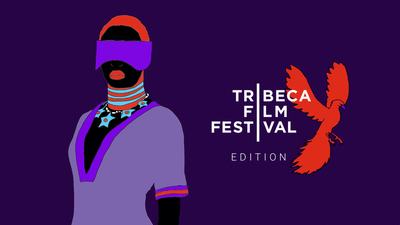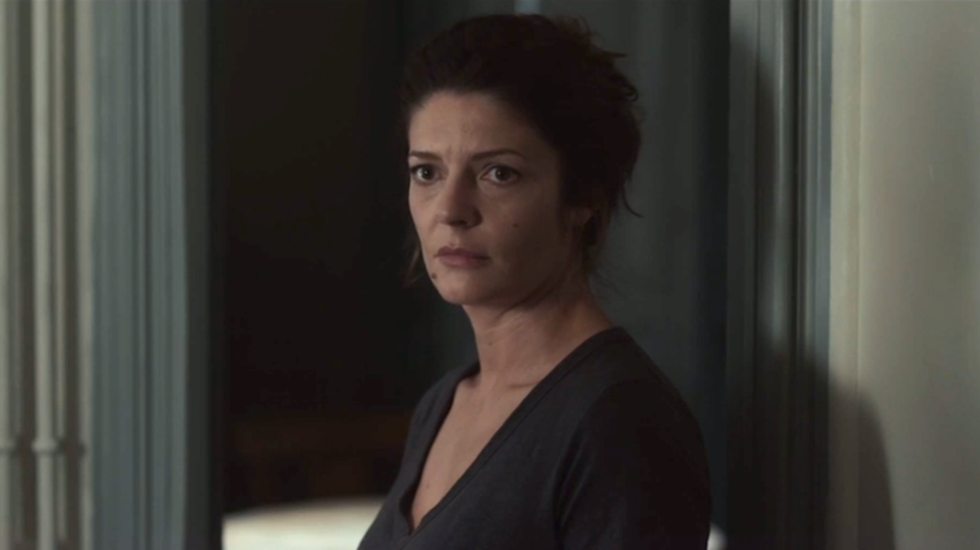
BY ZACHARY WIGON |
Interview: Claire Denis on 'Bastards' and the Mystery Of Cinema
"I do not create the space for the audience. I simply need them in the storytelling." Many filmmakers gravitate toward mysteries, but few have created puzzle-boxes that function as inventively as Claire Denis's "Bastards." We sat down with the acclaimed French director.

Internationally revered auteur Claire Denis is one of the most well-respected filmmakers working today, constantly experimenting with narrative forms (her famously inscrutable feature The Intruder was based upon a work of philosophy by Jean-Luc Nancy).
Denis is back with Bastards, her take on a specifically tragic kind of film noir, which is partially inspired by William Faulkner's lurid, written-to-get-rich-quick novel Sanctuary. Like Sanctuary, Bastards concerns an abducted young woman, though in the case of Denis's film the young woman has returned from abduction as the film begins.
Our protagonist, however, is Marco (Vincent Lindon, somber and perfect), a sailor who quits his job and returns home to help his sister after her husband commits suicide and her daughter Justine, the aforementioned abductee (Lola Creton), turns up walking down a Paris street wearing only a pair of high heels, in a fugue state. As Marco gets to work on figuring out who was behind Justine's abduction, and whether or not it relates to the businessman (Michel Subor) who bankrupted his brother-in-law's shoe factory, we're plunged down an increasingly terrifying rabbit hole of exploitation and double-crosses.
Like in all the classic film noirs, Denis has constructed a narrative that pits one good man against an almost institutionally powerful network of nefarious, self-serving interests; but unlike those classics, Denis has structured her film in a postmodern, elliptical fashion, with some scenes being presented achronologically and other scenes being revisited over and over again as new pieces of information surface.
Cleverly pairing the form of solving a mystery with the form of a flashback-riddled film, Denis exposes some fascinating formal potentialities lying dormant in the basement of cinematic style. I had the chance recently to sit down and discuss the picture with Denis, a uniquely mysterious filmmaker whose thoughts often retained the opacity of her moody, atmospheric story.
Tribeca: Your film recirculates to certain images over the course of the film, over and over again. It made me think of the way a mystery functions, in which you are perpetually returning to clues and looking at them from different angles, and it also made me think of the way cinema functions, in which you turn images over that become kind of bored into your mind. It recalled Hiroshima, Mon Amour and Last Year At Marienbad, for me. I was wondering if you had any thoughts on the connection between the structure of mystery and the structure of cinema, formally?
Claire Denis: It's not like a tool, like something you use when you're cooking - it's something that shows when you're writing the script. The effort of writing a script - it's important to have a sort of inside reason, or leitmotif, something that will anchor any narration into something that will be deep inside, like a motif, you know? I think of course this shape is already there in the script.
It would be terrific for me to make an American film, to be funny like Tarantino, but I'm me.
I have to say, if I don't feel that in a script, I am in trouble and I think I won't be able to make the film. It has to be - working on the script is sort of an exercise to be prepared for the shape of the film to come. So when you give me the example of Hiroshima, Mon Amour, I think the reason of the voice-over by Marguerite Duras and the sound of the voice of the actress, and the way Marguerite Duras says things as if the present was already past, it gives a sort of shape to the film, as if it was already gone. What is gone in Hiroshima, Mon Amour is what happened to the actress with the German soldier in Nevers, but what is gone is Hiroshima, the city - "You saw nothing at Hiroshima" - and what is gone is also the fact that the actress is leaving.
So I think all of that is contained in those voice-over lines, and it's as if those two characters were in love, but in a non-existent time. She's in the past, the city of Hiroshima is in the past, and the man she loves, his future is in Japan.
Tribeca: I wonder if there's something similar going on in this film. This film is about a guy trying to construct a narrative, in the present, of something that occurred in the past. It's almost as if the most important events in Bastards have already taken place when the film begins, and everything that happens from thereon out is like this inevitable chain reaction.
Claire Denis: I agree.
Tribeca: There's something kind of tragic and beautiful about that narrative construction.
Claire Denis: Yeah. I was mostly inspired by Faulkner, something in Faulkner. Faulkner's writing is the best way to describe what life is made of, to find where the tragedy is in life. It's not always a tragedy - sometimes there are good moments - sometimes you need to drink a lot to stand the bad moments - but everything is there, and you know exactly that they are heading in the direction of disaster.
In filmmaking, day by day you're fighting against all elements, like sailing a boat, you know? If it's bad weather, you have to react to that. If there's no wind, you cannot move.
Something tells you in the beginning - a young woman is leaving home, walking on a road, pregnant, and she's walking to the next city, which will have tragedy for her, too - that's the beginning of Light In August. There is something in Sanctuary that I always remember, and that's the end. After the kidnapping and rape of the girl with the corn, the father is rich, and suddenly - there isn't even a new chapter, you're in the courtroom during the trial, and in the next line you're in a park in Paris. It's not even written, "six months later" - the father and the daughter are just there, sitting in the park. You understand that the father is trying to help her to forget, and he has enough money to buy her anything, but he looks at her and he knows that it's not enough - nothing will repair it. He's looking at her, and she feels that the father is looking at her, and she opens a bag and takes out a powder box and powders her nose. That's all she does, and that's the end of the book. There is no better end to express what she's been through.
Tribeca: One of the narrative strategies of Bastards is to be a bit elliptical, like that jump in time in Sanctuary - a lot of the narrative is left for the audience to piece together. What is your understanding of the pact between the filmmaker and the audience?
Claire Denis: It's so lonely, most of the time - even during shooting the film, it's lonely - so this meeting with the audience is a sort of projection, but it's not about respect for the audience, which is an abstract metaphor. In filmmaking, day by day you're fighting against all elements, like sailing a boat, you know? If it's bad weather, you have to react to that. If there's no wind, you cannot move. So the audience is not always there, in my mind. The audience is like a friend, someone I know I'm going to meet later, but in between that moment of meeting and the moment of making the film - it's so huge, the gap in between. I cannot even imagine the film finished when we're shooting. So how can I imagine facing the audience, saying, this is my film, audience that I respect so much! No. I would be lying if I said that. I always hope that if I do things the way I like, I will end up having respected the audience. It would be terrific for me to make an American film, to be funny like Tarantino, but I'm me.
I do not create the space for the audience. I simply need them in the storytelling.
Tribeca: But it's refreshing, that your film provides a space for the audience to do some work to comprehend what's happened in the film.
Claire Denis: But it's not about a theory of the audience. I do not create the space for the audience. I simply need them in the storytelling. It's like jumping - it gives me a little fear, you know? I like that jump. I would be lying if I said, yeah, I like to give space for the audience to create. No, not at all. Suddenly, I realize that this little void is giving me an emotion. If you jump over a void, you are afraid of falling. That's it. If everything is about creating a cure, there is no emotion.
Tribeca: So you need to feel yourself taking that risk, as a storyteller.
Claire Denis: I'm not taking a risk; I jump. It's different.
Tribeca: It's been said that the reason the greatest American novelist emerged from the South was because the greatest American tragedy - slavery - occurred in the South. Do you feel like there is a tragedy that your film is born out of a tragic milieu?
Claire Denis: First, I will tell you something else that I realize comes from Faulkner. The fact that the police officer and the doctor are black, and both of them know that this family is completely dysfunctional - they try to help, but you cannot say, do this, do that, they have to understand. They are like the guardians of the story, you know? This, I guess, is related to the south, in many stories by Faulkner, black people are the guardians of the irrationality of the white people, hiding their feelings, hiding their shame, their guilt. So - your question was about slavery?
Tribeca: Well, if you see Bastards arising out of a tragic set of circumstances. I see it as emerging out of a kind of primal drive toward evil.
Claire Denis: I don't believe in evil. You know, the notion of taboo was invented out of the Pacific Islands, because they were so small that it was not necessary to have laws - a few taboos were enough to organize a society. I don't believe in evil. I think that the organization of a society is mainly to preserve the patrimony, to preserve the capital of a family. It's not the good against the evil, it's just a reason to organize the world, knowing that you cannot avoid things like father and daughter having relations, for instance. I don't believe in evil. Not even in the opposite - goodness. You know, we breathe air, and it's made of carbon and oxygen - you cannot separate them, they're together.

